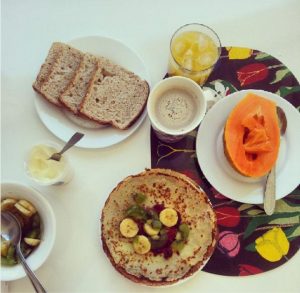There is nothing better than starting the day with a beautiful breakfast!
A full table, coloured by fruits and juices, appetizing thanks to freshly baked bread and fresh coffee, framed by loved ones and conversations that can vary from political discussions to the simple exchange of glances and smiles confirming the pleasure of the moment
 No matter where and with whom I am, I always make it a point to have breakfast. Of course, in most cases, it is much simpler and quieter than I would like, but it still does not lose its importance. I started to understand that this treat is so important to me through my husband, who is Swedish-American. The meal that really matters to him is dinner. Freshly cooked food, well made and plentiful is what is important to him.
No matter where and with whom I am, I always make it a point to have breakfast. Of course, in most cases, it is much simpler and quieter than I would like, but it still does not lose its importance. I started to understand that this treat is so important to me through my husband, who is Swedish-American. The meal that really matters to him is dinner. Freshly cooked food, well made and plentiful is what is important to him.
A few years ago, reading the book The Cultural Code, by French author Cloture Rapaille, I could finally understand a little better where this whole flood of feelings comes from because of a simple meal. According to Rapaille, all experiences until 7 years of age are registered in our unconscious. Immediately, childhood memories that support my idealized image of the first meal of the day started to come back to me.
Talking to my husband about it, he told me how fun it was visiting restaurants with his parents and the times he received the menu to choose what he would like to eat and the expectation about what would be served.
The appreciation for breakfast and for dinner we share in our family now has even more special importance with Martin, our first child. As soon as he started to try solid foods, we tried, as far as possible and respecting the limitations of each phase of his development, to pass on all these sensations linked to the most important meals in our family. Therefore, sitting at the table with us, to help himself to what is offered and participating in conversations in his own way are priorities at home.
 The moment gets even richer and more interesting considering our multiculturalism and the necessary adjustments so the meals keep their magic. In my breakfasts in Sao Paulo, for example, papaya had a guaranteed place every day. Here in Stockholm, due to climate reasons, the fruits vary according to the season and papaya is replaced by strawberries, bananas, blueberries and any other delicious fruit that we can find in the markets. The “requeijão de copo” (traditional Brazilian cream cheese), a great passion of my childhood, was easily replaced by the incredible “made in Sweden” butter. Toasted bread, ah, well that is a hugely popular both there and here!
The moment gets even richer and more interesting considering our multiculturalism and the necessary adjustments so the meals keep their magic. In my breakfasts in Sao Paulo, for example, papaya had a guaranteed place every day. Here in Stockholm, due to climate reasons, the fruits vary according to the season and papaya is replaced by strawberries, bananas, blueberries and any other delicious fruit that we can find in the markets. The “requeijão de copo” (traditional Brazilian cream cheese), a great passion of my childhood, was easily replaced by the incredible “made in Sweden” butter. Toasted bread, ah, well that is a hugely popular both there and here!
For dinner, which is my husband’s speciality, potatoes (the equivalent of rice and beans in Brazil) shares space with rice, couscous and pasta in our weekly menus.
We try to adapt our recipes to the cultural and sentimental memories of each of us and always include a lot of dialogue, patience and respect for the cultural diversity in our family. After all, like Riglea Brauer Holva so adeptly wrote in her first article here on Bossinha, citing the Belgian sociologist Léo Moulin, “We eat our memories, safer, temperate rites that mark early childhood.”
And you, dear readers who have pieces of your hearts in different parts of the world, what do you do at home to pass on the cultural memories linked to meals to the younger generations?
Read more about Brazilian lifestyle, travel, tourism and Brazilian and Latin American culture at BBMag the only London-based trilingual publication.
You can also find Brazilian and Latin American service suppliers and classifieds in London, and internationally, by visiting BBMAG Business Directory.
















